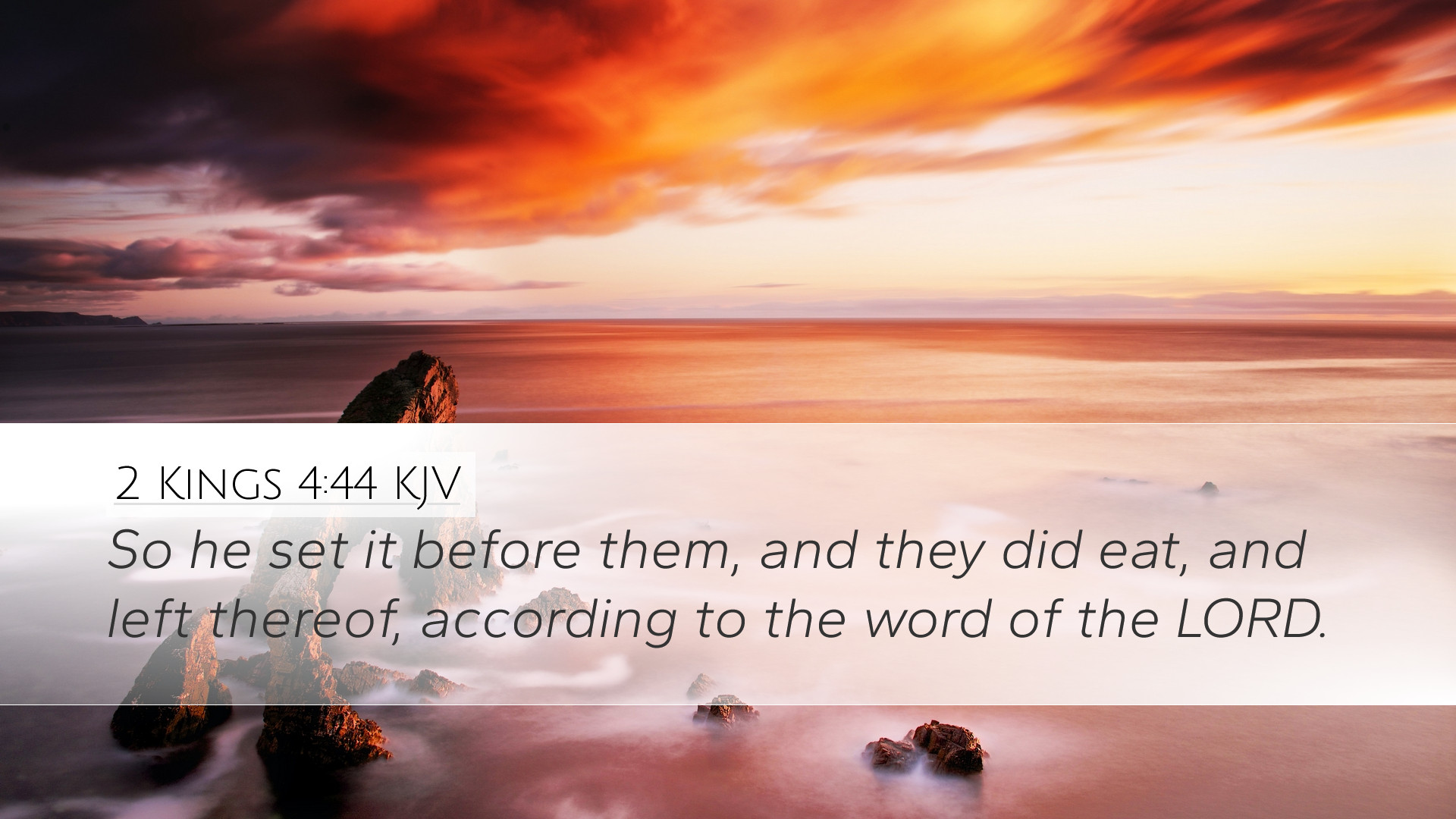Commentary on 2 Kings 4:44
Verse Context: In 2 Kings 4:44, we read, “And he set it before them, and they did eat, and left thereof, according to the word of the Lord.” This verse is part of a narrative that demonstrates the power of God to provide abundantly even in the face of scarcity. The story takes place during a time of famine, showcasing the themes of faith, divine provision, and the authority of God's word.
Summary and Insights from Public Domain Commentaries
Matthew Henry's Commentary
Matthew Henry observes that this miracle, which involved a small amount of food feeding a multitude, emphasizes God's extraordinary ability to bless and multiply what is given to Him in faith. He notes the practical nature of God’s miracles, where God not only meets spiritual needs but also temporal ones. Henry points out that the prophet Elisha, in obedience to divine instruction, took what was seemingly insufficient—a small amount of food—and made it sufficient through his faith in God.During this time of famine, such an act would have immense significance both for survival and as a demonstration of God’s providence.
Albert Barnes' Notes
Albert Barnes focuses on the implications of ‘left thereof’ as an indication of divine abundance. He explains that God's provision always exceeds human expectations and needs. Barnes emphasizes that the command given by Elisha to serve the offering showcases the importance of obedience, even when circumstances may seem dire. He encourages believers to grasp the significance of receiving God's word and acting upon it, as it results in miraculous outcomes. This act not only fulfilled the physical hunger of the people but also served as a sign of God’s covenant faithfulness to His people.
Adam Clarke's Commentary
Adam Clarke delves into the cultural implications of this passage, illustrating how the act of feeding the prophets was an important communal task. Clarke explains that the miracle occurred as a direct act of faith and reliance on God’s promise. He also highlights the symbolism of sharing a meal, which signifies unity and the sustenance of life. Furthermore, Clarke points out that this miracle also reflects the purpose of God’s prophets—to provide for and lead the community in both spiritual and practical matters. The emphasis is on the need for trust in God's provision during challenging times.
Theological Reflections
- Divine Provision: The passage serves as a reminder that God's resources are not limited and that His provision often surpasses human understanding. This calls Christians to trust in God's ability to supply needs, regardless of circumstances.
- Faith and Obedience: The act of presenting the food to Elisha and ministering to the needs of others demonstrates the connection between faith, obedience, and God's miraculous action. Believers are encouraged to take steps of faith, knowing that God uses ordinary efforts to accomplish extraordinary outcomes.
- Community and Service: The communal sharing of food signifies the importance of support within the faith community. This narrative underscores the role of believers in community—where sharing, caring, and serving others are manifestations of God’s love.
- Significance of Prophetic Ministry: Elisha’s role highlights the importance of prophets in guiding, nourishing, and sustaining God’s people through both spiritual and physical needs. It encourages an understanding of how God communicates and works through His appointed leaders.
Conclusion
In conclusion, 2 Kings 4:44 is a profound account that encapsulates the themes of faith, community, and divine provision. The insights provided by Matthew Henry, Albert Barnes, and Adam Clarke reveal the layered meanings within this scriptural passage, encouraging readers to reflect on their own faith and trust in God’s sufficiency. This narrative serves as an enduring reminder that nothing we offer God is too small for Him to use for His glory and the good of others.


